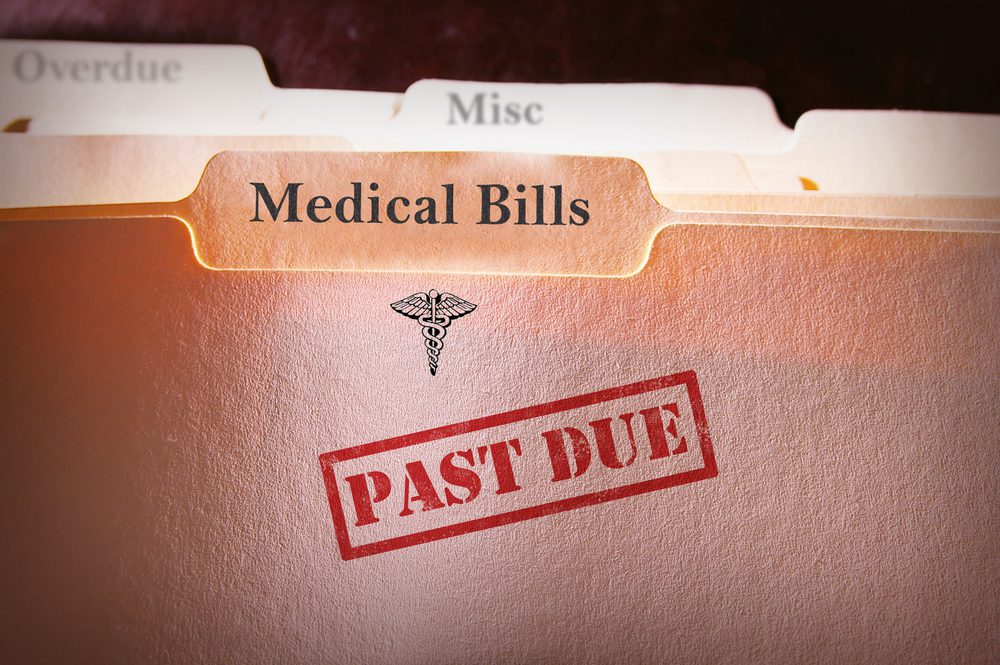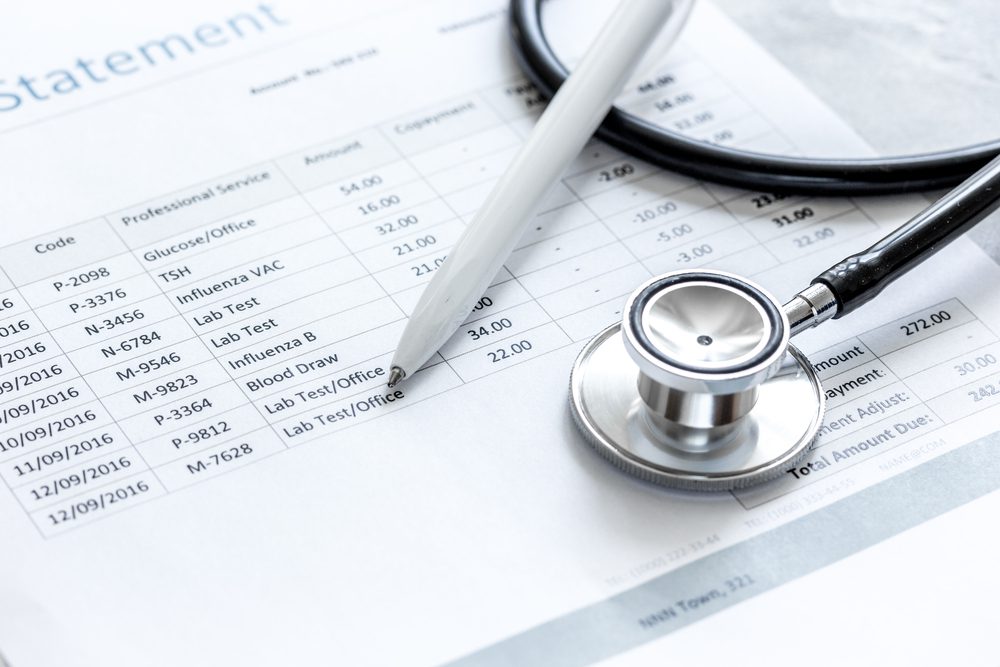
The fear over not being able to pay medical bills (and subsequently debts), has been clutching millions of Americans over the past couple of years. As costs for health care rise, we know it may be difficult for some households to handle them, which could lead to a variety of issues.
First off there’s the fright of even going into medical debt in the first place, which may cause people to stop going to doctor’s appointments, stop getting treatments, tests or prescriptions, and so on. These feelings alone may put people’s health in jeopardy.
Then there are those who have already accumulated medical debt and can’t even begin to pay it back. This could lead to some harsh, sometimes unwise financial decisions such as depleting your savings, ignoring other bills, damaging your credit, or even declaring bankruptcy.
Before you even get to that stage, we’re here to help you with some advice. What do we know about medical debt and what can you do when you can’t pay?
Medical Debt Is More Common Than You Think
The one thing it seems that a lot of people need to hear is that going into medical debt is not a personal failure. It’s an issue that doesn’t affect just low-income families or individuals. Even those with robust income or health insurance may struggle with their medical bills.
So much so that 137.1 million U.S. adults have claimed they’ve faced financial hardship due to this growing issue, according to The Journal of General Internal Medicine.
In some cases, people may need to postpone their plans in order to tackle the bills. Nevermind canceling vacation plans, some households have to put off major household purchases. Others might feel the need to borrow from family and friends while looking for ways to work from home in addition to taking up various gigs and even part-time jobs. It’s important to realize that not everybody has these capabilities.
Before you make any such plans, here are 5 things you need to do!
Check for Errors

Did you know that some medical bills can contain costly mistakes? Yeah, we know, it’s crazy to think about, especially when you consider the fact that various sources claim different numbers for how many of them actually contain errors. Basically, anywhere between 7% and 90%, which is not a very comforting figure.
That’s why it’s better to be safe than sorry. The first step, according to experts, is to immediately review the explanation of benefits statements from your insurers. As soon as you receive them it’s time to comb through everything carefully. You need to start looking for services you did not receive, duplicate items, and charges your insurance should have covered.
Secondly, start reviewing your health care provider’s bill too. Did your insurer pay them accurately? If there’s anything you’re unsure of, don’t just set it to the side. Anything that’s confusing should be brought up with either your provider’s billing department or your insurance company.
If you can, you should definitely get copies of your medical records in order to compare them with the other documents. There may be inconsistencies between what you’ve been charged and what’s actually been done to and for you. In most cases, you’ll probably need expert advice in order to get your hands on them, but it may be worth the effort.
Negotiate Your Bill
Many people think that as soon as you get your bill there’s not much you can do about it. But that’s not true, you still have the chance to negotiate prices. As with checking for errors, it’s important for you to do this as early as possible, otherwise, your credit score will suffer if the bill is delinquent and sent to collectors.
Start by researching fair prices from other health care providers in the area. This should give you a better idea of which items on your bill you should be tackling and thus which items the healthcare provider’s medical billing manager can actually lower. They’re responsible for your bill, so they’re the person you need to speak to about this.
New Choice Health and Healthcare Bluebook are two great places to start as they’ll show you what other providers charge, but your insurance company should also have a similar list, so ask them for one or ask them to redirect you to the right spot on their website.
Now that you’ve got all this information it’s time to sit down with the medical billing manager. Let them know you’ve experienced financial hardships, even if those hardships were solely brought on by the bill they sent you! If you’re low-income you might be able to contact the hospital’s charity care team which will help you save more money based on your income.
Also, don’t forget that hospitals are required by state law to provide reduced and in some cases free services to low-income patients!
All in all, make sure that your health care provider knows you’re having difficulties paying the bill and they might be able to help you right then and there!
Advocate for Yourself

Your medical bills might be too big to pay as a whole, but you might have enough money stashed away for at least 30%. It might sound ludicrous but believe us, some providers would rather save time and money by taking that 30% instead of fighting you tooth and nail for every last penny.
So, a good idea would be to say you can pay for 30% right then and there if they will write off the rest of the sum. Of course, some might disagree with this, but there’s no reason to not be aggressive in your negotiation. After all, the alternative could be devastating to your finances.
Another idea is to ask for steep discounts in return for a large downpayment, or you could even ask for the discount fee that Medicaid and Medicare pays. Worst-case scenario you won’t be able to reduce your payments. In that case, asking for a zero-interest payment plan could be your last shot.
Whichever one of these strategies work, make sure you get the deal in writing!
Get Outside Help
Doing this all on your own will be difficult in some cases, which is why you should enlist the help of a professional: a debt negotiator, a medical bill advocate, or a medical caseworker. They will know the in and outs of the system and can help you navigate your way towards a cheaper medical bill.
A caseworker from the insurance company or hospital will help you understand your bills and resolve payment issues, such as if you’ve found any errors. They could also help you find charities, community organizations, government agencies or even churches that may offer financial assistance.
On the other hand, you could speak to a medical bill advocate. They are typically healthcare administrators, nurses, lawyers, or insurance agents that can also give you advice on how to proceed. Like caseworkers, they too can help you understand your bills. Furthermore, they can negotiate on your behalf. Typically, you’ll have to pay them about 30% of the amount by which your bill was reduced.
In some cases, your medical bill could lead to other types of debt, putting you in an even worse financial situation. The American Fair Credit Council can help put you in contact with a reputable debt-relief company. They can reduce your principal balance, your interest, or both so you can start restoring your credit.
The Bottom Line

There is no reason you should feel ashamed for not being able to pay medical bills. Remember, plenty of people with various types of income and insurance face the same struggles as you! Our healthcare might be phenomenal at finding and fixing our medical issues, but when it comes to health economics, we must all admit that it’s not always easy on the patient or consumer.
Don’t try to tackle these issues alone. Looking for ways to lower your bill and debt is crucial, otherwise, you’ll pay for it a lifetime. And in cases in which you can’t even work following your medical issue, it’ll be even harder to try and tackle the debt with the usual methods which involve budgeting and cutting costs.
Remember, most Americans struggle with this issue, as it’s a growing problem in the United States. But by checking your bill for error and contacting the right advocates and helpers you could make it safely across this difficult road.
You might also like: 10 Ways to Avoid Funeral Debts






























